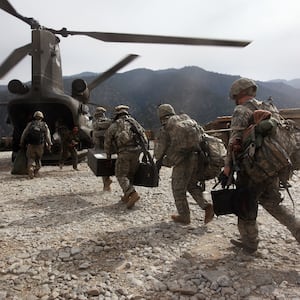In May 2008, a Taliban sniper round hit the top of a wall just inches from my head.
The photos of me reeling back and falling to the dirt were shared by the Pentagon to show the sacrifice of bravery of Americans on the Helmand Province frontline—even though there were already signs we didn’t want to win the war.
A little more than two years later, in October 2010—nine years after I watched the Twin Towers fall at the end of my training at Camp Lejeune—I woke up with my head duct-taped to my fridge with an I.V. drip in each arm. I had just downed two liters of tequila as fast as I could, and left a note for my wife saying goodbye.
I couldn’t take the nightmares and the flashbacks anymore.
Two months earlier I was caught in an IED blast in Marjah, on my fourth tour of Afghanistan, that left me with brain injuries that caused memory loss and a rage disorder. My combat career was over and my health was in the government’s hands. I was declared 100 percent disabled by the VA, but nine years after leaving the Marines I have still not been medically retired.
When I go to the Veterans Administration (VA) to get treatment from a doctor or psychologist, they tell me: “You’ve seen your physician once this year, why would you need to see them again?”
So they prescribe some more powerful prescriptions and send me on my way.
Was It Worth It?
As I watched the completely avoidable debacle that was the U.S. troop withdrawal from Kabul last year, I asked myself if the sacrifice was worth it for me and my friends.
It’s an impossible question.
Mothers lost sons and daughters in mud holes 5,000 miles away. And at the same time, Afghan girls were able to go to school rather than be married off at 10 to a 60-year-old man, because of the work we did. But if the reward for veterans is returning to a medical system ill-prepared to deal with the physical and psychological injuries they suffered in combat, what is the point?
When I left the Marine Corps in 2013 after 13 years, I began my civilian career working as a counselor and adviser talking to veterans about how much the VA is there for them.
The problem is, the VA wasn’t, and in most instances it still isn’t. I learned firsthand there was next to nothing for many of the men and women who had spent years fighting the Taliban after 9/11.
Like me, many of the veterans I counseled had just graduated high school and weren’t old enough to buy a beer when they were shipped to a country that until recently had been ruled by fascists imposing a seventh-century interpretation of Islam on the people. Now, it was ruled by a corrupt central government with little authority beyond Kabul, and regional warlords from villages with names they couldn’t pronounce. Most of them, like me, had never left the United States.

United States Marines from Bravo Co. of the 15th MEU (Marine Expeditionary Unity) march into a barracks in full battle gear as they arrive very early 29 November 2001 morning at the US Marines forward base in southern Afghanistan.
JIM HOLLANDER/AFP via Getty ImagesI was one of the first Americans on the ground at Kandahar Air Base in 2001 and our objective was to obliterate the Taliban.
But by my final tour in 2010, I could see that there was no real desire to win the war from the U.S. or the Afghan army.
We were mostly playing detective to find out which locals were being extorted so their opium poppy seeds could be used in the heroin trade. Marines were also terrified about breaking strict rules of engagement put in place by General Stanley McChrystal than they were in hunting the terrorists we were sent there to find.
I stopped believing the mission and became more focused on getting my men home. Some of them didn’t return, and it was my fault. For the next ten years, my desire to leave Afghanistan victorious and with a democracy in place disintegrated.
That’s why the horrifying scenes from August 2021 shouldn’t have come as a surprise. Any young lance corporal on their first deployment would have seen it coming—but the armchair generals in their ivory towers had blinders.

In this handout provided by the U.S. Air Force, an air crew assigned to the 816th Expeditionary Airlift Squadron assists evacuees aboard a C-17 Globemaster III aircraft in support of the Afghanistan evacuation at Hamid Karzai International Airport on August 21, 2021 in Kabul, Afghanistan.
Taylor Crul/U.S. Air Force via Getty ImagesThe scenes of men, women, and children in stampedes desperately trying to get out of Hamid Karzai International Airport represented the implosion of 20 years of fighting and the desperation veterans still face.
It fills me with fury that my story isn’t unique.
This Is How You Treat Heroes?
By 2014, a year into my new civilian life, the list of powerful medications I was prescribed had increased to eighteen pills every day. I lined the opioids up on the table and popped them one by one, in a ritual more natural than breakfast.
There was a bottle for depression, another for seizures, one to help me sleep, another for panic attacks, one for anxiety, another for low testosterone, and medication for ulcers.
The drugs the VA loaded me up on, while I waited to see a doctor or specialist, horrified my wife, Bobbie, and she spent hours online researching the side effects to make sure I was safe.
One day, while scrolling through information about sumatriptan succinate, the pill I took to help ease my migraines, she discovered it could kill me if I mixed it with other drugs—including Paroxetine, another item on my long list of prescriptions. The combination would create a cocktail that could cause my serotonin levels to increase to the point it was fatal.
I developed stomach problems, and would spend hours throwing up in the bathroom because of the pills doing untold damage to my body. Bobbie told my doctors she would no longer allow me to take them, but they kept filling out scripts believing it would help ease my suffering, when all it did was make it worse.
The VA staff thought I could fend for myself with this magical collection of pill bottles. But even more shocking is the fact that almost 68,000 veterans in VA care were addicted to opioids at the time—many because of being over-prescribed.
To be sure, not all of the VA is broken. The majority of doctors and nurses working at the hospitals and clinics care deeply for veterans, and should be given sainthoods for the work they do. But the access to vital care isn’t there. In my hometown of Jacksonville, North Carolina, there are two doctors for a town of thousands of veterans.
The fat-cat administrators who run things are also cashing in their bonuses. Executives took home $278 million in 2013 for the supposed work they had done. What if that money had been used for more doctors, nurses, and psychologists?
Personally, I refuse to believe that the sacrifice of even one Marine was in vain. We gave Afghanistan a glimpse of freedom for 20 years.
Some Americans have good experiences with the VA and others simply don’t need its care. Others struggle, like me, when it should be far easier. All veterans should be able to get a doctor’s appointment without waiting weeks, and should be given the decency of proper, attentive care after risking their lives thousands of miles away.
My anger over this country’s treatment of veterans—which claims to celebrate as heroes—is why I finally built up the courage to tell my story in my book, The Shot.
Now I know, more than ever, my experience is one that needs to be shared and understood. There are men and women who need help now, and there will be many more in the future.






